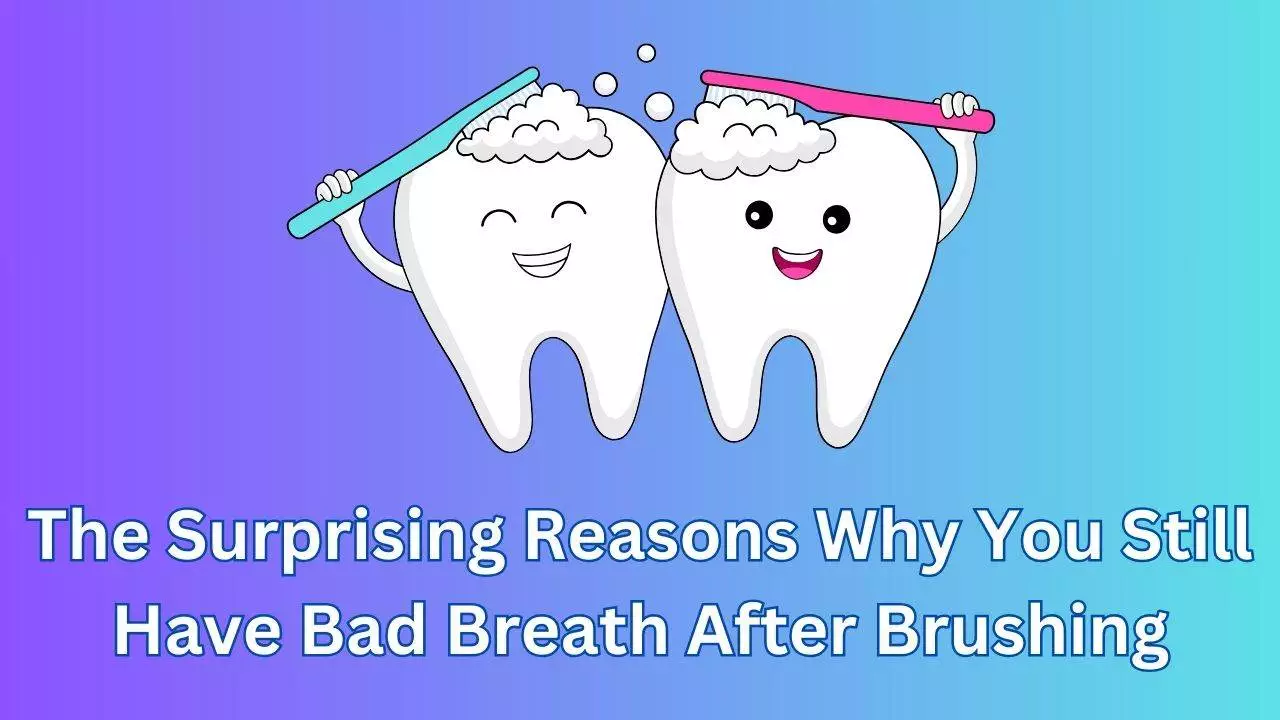
Introduction
Good oral hygiene and fresh breath are not only important for maintaining a healthy mouth, but they also play a crucial role in our overall well-being and confidence. Bad breath, also known as halitosis, can be embarrassing and can negatively impact our social interactions. However, there are many misconceptions about the causes of bad breath. Contrary to popular belief, it is not always solely due to poor oral hygiene. In this article, we will explore the various factors that contribute to bad breath and discuss effective strategies for banishing it for good.
The Root Causes of Bad Breath: Beyond Poor Oral Hygiene
While poor oral hygiene is a common cause of bad breath, it is not the only factor at play. Bacteria in the mouth are a major contributor to bad breath. When we eat, food particles can get trapped in between our teeth and along the gum line. If these particles are not properly removed through brushing and flossing, bacteria in the mouth break down the food, releasing foul-smelling gases. Additionally, poor oral hygiene can lead to gum disease, which can also contribute to bad breath.
However, there are other factors that can cause bad breath as well. Sinus infections, for example, can lead to post-nasal drip, which can result in bad breath. Tonsil stones, which are small, calcified deposits that form in the crevices of the tonsils, can also cause bad breath. These stones are formed by the accumulation of bacteria, mucus, and food particles, and can emit a foul odor.
Foods and Beverages That Can Leave Your Breath Smelling Foul
Certain foods and beverages can leave your breath smelling less than pleasant. Garlic and onions are notorious culprits when it comes to causing bad breath. These foods contain sulfur compounds that are released when they are digested, and these compounds can linger in the mouth and be exhaled, resulting in bad breath. Coffee is another common offender, as it can dry out the mouth and leave a strong odor.
The way these foods and beverages affect breath odor is through their chemical composition. The sulfur compounds in garlic and onions, for example, are volatile and can be easily released into the air. Coffee, on the other hand, can cause dry mouth, which reduces saliva production and allows bacteria to thrive, leading to bad breath.
Medical Conditions That Contribute to Chronic Bad Breath
In some cases, bad breath can be a symptom of an underlying medical condition. Diabetes, for example, can cause a fruity or sweet odor on the breath. This is due to the body’s inability to properly metabolize sugar, leading to the production of ketones, which are released through the breath. Liver disease can also cause bad breath, as the liver plays a role in detoxifying the body and removing toxins. When the liver is not functioning properly, toxins can build up in the body and be released through the breath.
These medical conditions affect breath odor by altering the chemical composition of the breath. The presence of ketones in diabetes, for example, can result in a distinct odor. Similarly, the buildup of toxins in the body due to liver disease can lead to a foul smell on the breath.
The Role of Dry Mouth in Bad Breath
Saliva plays a crucial role in maintaining fresh breath. It helps to wash away food particles and bacteria, neutralize acids in the mouth, and keep the mouth moist. When the mouth becomes dry, either due to natural factors or external factors such as medication, it can lead to bad breath. Dry mouth allows bacteria to thrive, as there is less saliva to wash them away. This can result in the production of foul-smelling gases and contribute to bad breath.
Dry mouth can be caused by a variety of factors, including certain medications, breathing through the mouth, and dehydration. It is important to address dry mouth to prevent bad breath and maintain oral health. Drinking plenty of water, using saliva substitutes, and avoiding mouth-breathing can help alleviate dry mouth and improve breath odor.

How Stress and Anxiety Impact Your Breath
Stress and anxiety can have a significant impact on our body’s natural processes, including saliva production. When we are stressed or anxious, our body goes into fight-or-flight mode, which can lead to a decrease in saliva production. This can result in dry mouth and contribute to bad breath.
Additionally, stress and anxiety can also lead to changes in our eating habits. Some people may turn to comfort foods that are high in sugar or carbohydrates, which can increase the risk of tooth decay and bad breath. Others may skip meals or eat irregularly, which can disrupt the balance of bacteria in the mouth and contribute to bad breath.
Smoking and Bad Breath: Understanding the Connection
Smoking is not only harmful to our overall health, but it can also have a negative impact on breath odor. The chemicals in tobacco smoke can linger in the mouth and lungs, resulting in a stale, unpleasant odor. Additionally, smoking can dry out the mouth and reduce saliva production, allowing bacteria to thrive and contribute to bad breath.
Quitting smoking is not only beneficial for your overall health, but it can also improve breath odor. Within a few days of quitting, you may notice a significant improvement in the freshness of your breath. It is important to seek support and resources to help you quit smoking and maintain good oral hygiene to improve breath odor.
Medications That Can Leave You with Unpleasant Breath
Certain medications can have side effects that contribute to bad breath. For example, some antidepressants and antihistamines can cause dry mouth, which can lead to bad breath. Other medications, such as those used to treat high blood pressure or heart disease, can cause a metallic taste in the mouth, which can also affect breath odor.
These medications affect breath odor by altering saliva production or the chemical composition of the breath. Dry mouth, as mentioned earlier, can allow bacteria to thrive and contribute to bad breath. The metallic taste caused by certain medications can also result in an unpleasant odor.
Digestive Issues and Halitosis: What You Need to Know
Digestive issues can also contribute to bad breath. Acid reflux, for example, can cause stomach acid to flow back into the esophagus and mouth, resulting in a sour or bitter taste and odor. Additionally, certain digestive disorders, such as gastritis or irritable bowel syndrome, can cause an imbalance in gut bacteria, which can lead to bad breath.
These digestive issues affect breath odor by introducing stomach acid or altering the balance of bacteria in the gut. The acid reflux can result in a sour or bitter taste and odor, while the imbalance in gut bacteria can lead to the production of foul-smelling gases.
The Impact of Poor Sleep Habits on Your Breath
Sleep plays a crucial role in our overall health, and it can also affect breath odor. When we sleep, our body goes through a process of self-cleaning and detoxification. This includes the production of saliva, which helps to wash away bacteria and food particles. When we do not get enough sleep or have poor sleep quality, this process can be disrupted, leading to bad breath.
Additionally, poor sleep habits can also contribute to dry mouth. Breathing through the mouth while sleeping can dry out the mouth and reduce saliva production, allowing bacteria to thrive and contribute to bad breath.
Effective Strategies for Banishing Bad Breath for Good
There are several strategies that can help improve breath odor and banish bad breath for good. First and foremost, practicing good oral hygiene is crucial. This includes brushing your teeth at least twice a day, flossing daily, and using mouthwash. It is also important to clean your tongue, as bacteria can accumulate on its surface and contribute to bad breath.
Staying hydrated is also important for maintaining fresh breath. Drinking plenty of water helps to keep the mouth moist and wash away bacteria and food particles. Chewing sugar-free gum or sucking on sugar-free mints can also help stimulate saliva production and freshen breath.
If you have persistent bad breath despite practicing good oral hygiene and staying hydrated, it is important to see a dentist or doctor. They can evaluate your oral health and overall health to determine if there are any underlying issues contributing to bad breath. They may recommend further treatment or lifestyle changes to improve breath odor.
Conclusion
In conclusion, good oral hygiene and fresh breath are important for our overall health and confidence. Bad breath can be caused by a variety of factors, including poor oral hygiene, bacteria in the mouth, certain foods and beverages, medical conditions, dry mouth, stress and anxiety, smoking, medications, digestive issues, and poor sleep habits. By understanding the root causes of bad breath and implementing effective strategies, such as practicing good oral hygiene, staying hydrated, and seeking professional help when needed, we can banish bad breath for good and improve our overall health and confidence.









